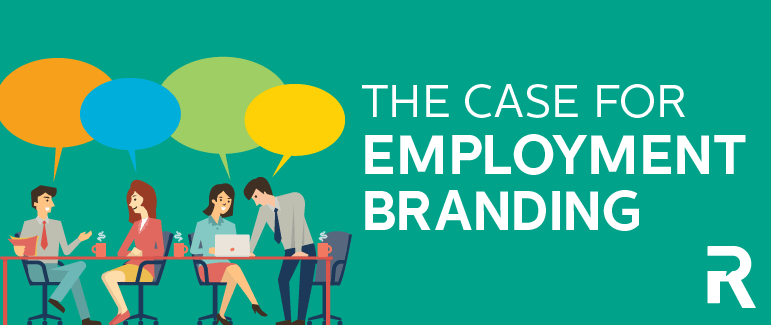
Ask a few people around you what it’s like to work for Google. You’ll probably hear words like “innovative, collaborative, techie, cool, open. The crazy part is that the people you asked have probably never worked at Google. The same test usually works remarkably well for big brands like Amazon, Southwest Airlines and Red Bull.
And that’s the amazing thing about employment branding—just like a corporate brand, the reputation can often precede the experience. We don’t need to work for a company to have an understanding of their employment brand. Somehow, we just know.
An employment brand is the market perception of what it's like to work for an organization. In other words, it’s the image that your prospective, current and past employees have in their minds about the employment experience at your company. This includes characteristics like the organization’s company culture, work environment, employee benefits, and employee value proposition.
Research from the Bureau of Labor Statistics shows that more jobs are becoming available at the same time that fewer candidates are entering the job market. As a result, the war for talent is intensifying. So if your company wants to keep its positions filled, you need to have a strategic advantage. Otherwise, what's stopping your prospective and current employees from working for your competitors instead? By developing and marketing your employment brand, you can ensure that job seekers know why they should work for you.
While any company can create an employment brand, building one that is truly effective is more challenging. It requires researching your target candidates, reviewing your competitors’ employment brands, and successfully executing and positioning the brand. However, the extra effort is unquestionably worth it. When you have a strong and strategic employment brand, it accomplishes the following:
Employers often talk about wanting to hire the best talent or the best person for the job. But the reality is that your candidates also need to be the right fit for your organization. For example, let's say we interview a software developer who seems to be the perfect job fit based on their knowledge and proficiency in programming languages. However, the candidate prefers to work remotely and independently–and your company has a very collaborative culture. This interviewee may not be the right person for the job, afterall.
By clearly stating who you are as an organization and what you offer, you’ll help job seekers understand what it’s like to work for your organization. Through this communication, you will further engage the right talent and inadvertently help unfit candidates select out. The stronger the employment brand, the more successful you will be at attracting the right people.
The famous author and researcher Michael Porter stated two general strategies to achieve competitive advantage in a broad market for customers: differentiation or cost leadership. To attract customers, you can either ”compete on price” or “be different ” with a unique competency valued by your audience.
The same logic is largely true in recruitment—you can offer something unique to your target candidates or you can pay them the most. And for the average company, paying the most is not a long-term viable recruitment strategy. Plus, studies show that most job seekers would accept a lower salary if it meant working for an organization with a strong employment brand. In other words, building a strong employment brand can be the most cost-effective way to successfully compete.
So whatever it is that your organization has to offer, make sure that it resonates with the people you are trying to attract to your organization. It could be the diversity that your company culture offers, flexible hours, or innovative technology. If you need help determining what your unique offerings are, read 6 Steps to Building an Employee Value Propositon.
By communicating upfront and clearly what it’s like to work for your organization, you set expectations about what it means to be a successful employee at your company. You can showcase the skills and traits that are highly valued in your organization so that new hires know how to behave upon starting.
This communication resonates with the job seekers who are able and willing to meet these expectations. As a result, the ones who apply and get hired are less likely to leave your organization. In fact, HRO Today states that employment branding can reduce employee turnover by nearly two-thirds.
So, how do you know if you have a strong and clear employment brand? Give yourself the employment brand 4-step assessment:
Go to your careers website and put your hand in the top left-hand corner so you are covering the company logo. Look at the images on the pages and read through the text.
During your interviews with candidates, be sure to ask them why they applied to your position.
If you’ve discovered that there are opportunities to strengthen your organization’s employment brand, pursue them as soon as possible. By taking initiative to improve your organization's image as an employer, you can transform your talent pipeline for the better. As a result, you will be able to fill positions faster and more effectively, which will empower your business and team to excel.